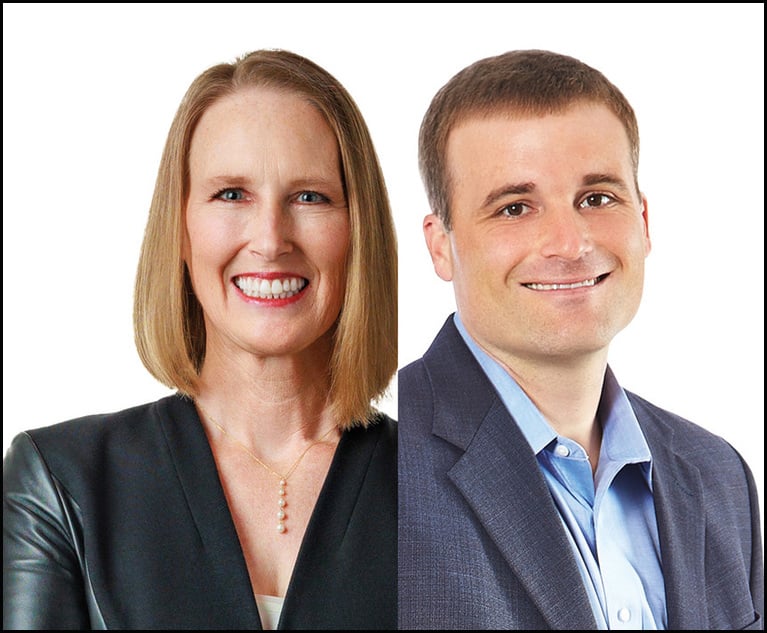Prenatal Testing Foes Finally Ready to Rumble in SF Patent Trial
Ariosa Diagnostics and Illumina Inc. are going to trial Monday in U.S. District Judge Susan Illston's San Francisco courtroom in a dispute over hundreds of millions of dollars and the IP used in non-invasive prenatal testing.
January 04, 2018 at 06:34 PM
7 minute read

They've fought at the Federal Circuit five times. They've crossed swords at the Patent Trial and Appeal Board at least five more.
Finally, after five years of bobbing and weaving, Ariosa Diagnostics Inc. and Illumina Inc. are going to trial Monday in U.S. District Judge Susan Illston of the Northern District of California's courtroom. At stake in the patent infringement and licensing dispute are potentially hundreds of millions of dollars and the fate of Ariosa's Harmony Prenatal Test. Both sides are backed by high-profile IP litigation teams: Irell & Manella for Ariosa and Weil, Gotshal & Manges for Illumina.
San Diego-based Illumina Inc. says its DNA sequencing and IP power all of the major lab testing companies that perform non-invasive prenatal testing (NIPT)—screening for genetic defects by analyzing blood rather than amniotic fluid. The exception is Ariosa, which Illumina accuses of free riding on its intellectual property, then undercutting its business partners by offering the Harmony test at “lowball” prices.
Backed by Weil partners Edward Reines and Derek Walter, Illumina is asking for $100 million in damages—trebled to $300 million for willful infringement—and an injunction shutting down Ariosa's Harmony test. “Through its low-ball pricing practices—which continue today—Ariosa has caused long-term harm to Illumina, its many partners, and the NIPT market as a whole,” Illumina alleges in a pretrial statement signed by Reines.
San Jose-based Ariosa was until recently a customer of Illumina's too. Ariosa says their supply agreement included a license to Illumina's IP. But once Illumina acquired Ariosa competitor Verinata Health in 2013, the relationship turned south. Illumina breached the agreement in bad faith, Ariosa says, by suing notwithstanding the license, and timing the suit to disrupt Ariosa's planned IPO. Instead, the company was acquired by Roche Molecular Systems Inc. in 2014.
Ariosa also is seeking $100 million, and the freedom to continue marketing a prenatal test it describes as far less expensive and more accessible than the Illumina-based options. Ariosa is represented by an Irell & Manella team led by partners David Gindler, Alan Heinrich and Lisa Glasser and counsel Sandra Haberny. “Illumina abused its position as Ariosa's sole source supplier in an attempt to extract unjustified 'licensing' fees for patents that Ariosa does not infringe or need,” Gindler writes in his part of the pretrial statement.
The market for non-invasive prenatal tests is less than seven years old, but it's already estimated to be worth more than $1 billion and still growing rapidly. So naturally it's already generated waves of IP litigation. Gindler and Ariosa were at the center of it in 2015, winning a groundbreaking decision at the U.S. Court of Appeals for the Federal Circuit that a patent held by competitor Sequenom was ineligible for patent protection.
Ariosa has had less success trying to invalidate the DNA sequencing patents that Illumina says undergird the Harmony test. The Patent Trial and Appeal Board has turned back at least five administrative challenges to the two patents at issue in the trial, though Illston is letting Ariosa try again with different prior art.
The case could come down to whether Illumina has already granted Ariosa a license to the same patents it's now asserting. Illston is leaving that decision to the jury.
Ariosa began operations in 2010. Co-founder John Stuelpnagel and Chief Scientific Officer Arnold Oliphant had worked previously at Illumina, and helped persuade Illumina to invest in Ariosa. As part of the process Ariosa shared confidential information about how the Harmony test works, including details about the DNA screening process that's now in dispute, Ariosa says. The two companies struck a $17 million deal in 2012 for Illumina to be its exclusive supplier of DNA sequencing equipment and the reagents used in the process. The supply agreement doesn't refer to any specific patents, but it grants Ariosa the “core” intellectual property rights “that pertain to the goods.” Ariosa argues that includes any patents necessary to perform the tests.
Ariosa says everything went fine until Illumina acquired Verinata Health, maker of the competing Verifi Prenatal Test, in 2013. By the next year, Illumina was accusing Ariosa of breaching the supply agreement by screening not only for genetic defects but also for sex determination. Gindler calls this a “pretextual” claim that Illumina tried to use to leverage “exorbitant and unjustified additional 'test' fees.”
This came at a delicate time for Ariosa, which was gearing up to raise $50 million to $60 million in an IPO. On April 24, 2014, the day the company announced the IPO pricing and executives gathered for a “roadshow,” word came that Illumina was refusing further negotiations and that it would soon terminate the supply agreement. Illumina filed its patent infringement suit the next day. The IPO was canceled.
“Illumina's actions were in bad faith, and caused Ariosa to abandon its IPO and lose significant amounts of money in the process,” Gindler writes.
Illumina sees it differently. In 2012, it says, four different companies—Ariosa, Sequenom, Verinata and Natera—were offering competing testing services. That caused confusion over the ownership of intellectual property, leading, for example, to the Ariosa-Sequenom litigation. Illumina says it sought to “consolidate the IP” in order to “grow the market for NIPT and make it more readily available to pregnant women.”
Illumina acquired Verinata for $350 million, then entered into a patent pooling arrangement with Sequenom for $60 million. The strategy worked, Reines writes in his pretrial statement. “Illumina has entered into supply agreements with nearly every major laboratory testing company in the United States, including LabCorp and Quest Diagnostics, among others, to supply sequencing equipment, reagents, and licenses to perform NIPT.”
But Ariosa has refused to play ball, Illumina says. “Unlike essentially every other player in the industry, it has disregarded Illumina's and Verinata's patents and does not pay a test fee,” Reines writes.
Illumina contends that the Ariosa IPO was on the rocks before its patent suit. Verinata had filed a similar suit even before its acquisition by Illumina. By 2014, Illumina recognized that Stuelpnagel and Oliphant had “co-opted” foundational Illumina IP for analyzing hundreds of DNA sequence fragments at once. It's the same technology they helped develop while working at Illumina in early 2000s, Illumina says.
As for the supply agreement, Illumina says it contains no promise not to sue. The company says it held up its end of the bargain, continuing to supply Ariosa after filing suit until the agreement expired in 2015. The only IP license conceivably granted is “very limited” and confined to the specific goods supplied. “Other products not purchased from Illumina or products that Ariosa develops itself—such as the accused products in this litigation—are not covered,” Reines writes.
Following Illumina's suit, Ariosa redesigned Harmony to run on an DNA analysis platform supplied by Affymetrix. But Illumina says the new version still infringes, and is asking Illston to enjoin Ariosa from marketing the Harmony test.
On summary judgment, Illston suggested that Illumina is construing the supply agreement too narrowly.
“If Ariosa establishes that it had a license to the '794 patent under the agreement, then the filing of the patent infringement lawsuit may constitute a breach,” she wrote. “The agreement explicitly contemplated Ariosa's ability to use the goods supplied by Illumina. Thus, Ariosa may argue that Illumina interfered with Ariosa's right to use the goods within the Customer Field of Use to support its breach of covenant claim.
“Whether Illumina did so,” Illston wrote, “is for the jury.”
This content has been archived. It is available through our partners, LexisNexis® and Bloomberg Law.
To view this content, please continue to their sites.
Not a Lexis Subscriber?
Subscribe Now
Not a Bloomberg Law Subscriber?
Subscribe Now
NOT FOR REPRINT
© 2025 ALM Global, LLC, All Rights Reserved. Request academic re-use from www.copyright.com. All other uses, submit a request to [email protected]. For more information visit Asset & Logo Licensing.
You Might Like
View All


TikTok Hit With California Class Action for Allegedly Mining Children's Data Without Parental Consent

Khan Defends FTC Tenure, Does Not Address Post-Inauguration Plans
Trending Stories
- 1SDNY US Attorney Damian Williams Lands at Paul Weiss
- 2Litigators of the Week: A Knockout Blow to Latest FCC Net Neutrality Rules After ‘Loper Bright’
- 3Litigator of the Week Runners-Up and Shout-Outs
- 4Norton Rose Sues South Africa Government Over Ethnicity Score System
- 5KMPG Wants to Provide Legal Services in the US. Now All Eyes Are on Their Big Four Peers
Who Got The Work
Michael G. Bongiorno, Andrew Scott Dulberg and Elizabeth E. Driscoll from Wilmer Cutler Pickering Hale and Dorr have stepped in to represent Symbotic Inc., an A.I.-enabled technology platform that focuses on increasing supply chain efficiency, and other defendants in a pending shareholder derivative lawsuit. The case, filed Oct. 2 in Massachusetts District Court by the Brown Law Firm on behalf of Stephen Austen, accuses certain officers and directors of misleading investors in regard to Symbotic's potential for margin growth by failing to disclose that the company was not equipped to timely deploy its systems or manage expenses through project delays. The case, assigned to U.S. District Judge Nathaniel M. Gorton, is 1:24-cv-12522, Austen v. Cohen et al.
Who Got The Work
Edmund Polubinski and Marie Killmond of Davis Polk & Wardwell have entered appearances for data platform software development company MongoDB and other defendants in a pending shareholder derivative lawsuit. The action, filed Oct. 7 in New York Southern District Court by the Brown Law Firm, accuses the company's directors and/or officers of falsely expressing confidence in the company’s restructuring of its sales incentive plan and downplaying the severity of decreases in its upfront commitments. The case is 1:24-cv-07594, Roy v. Ittycheria et al.
Who Got The Work
Amy O. Bruchs and Kurt F. Ellison of Michael Best & Friedrich have entered appearances for Epic Systems Corp. in a pending employment discrimination lawsuit. The suit was filed Sept. 7 in Wisconsin Western District Court by Levine Eisberner LLC and Siri & Glimstad on behalf of a project manager who claims that he was wrongfully terminated after applying for a religious exemption to the defendant's COVID-19 vaccine mandate. The case, assigned to U.S. Magistrate Judge Anita Marie Boor, is 3:24-cv-00630, Secker, Nathan v. Epic Systems Corporation.
Who Got The Work
David X. Sullivan, Thomas J. Finn and Gregory A. Hall from McCarter & English have entered appearances for Sunrun Installation Services in a pending civil rights lawsuit. The complaint was filed Sept. 4 in Connecticut District Court by attorney Robert M. Berke on behalf of former employee George Edward Steins, who was arrested and charged with employing an unregistered home improvement salesperson. The complaint alleges that had Sunrun informed the Connecticut Department of Consumer Protection that the plaintiff's employment had ended in 2017 and that he no longer held Sunrun's home improvement contractor license, he would not have been hit with charges, which were dismissed in May 2024. The case, assigned to U.S. District Judge Jeffrey A. Meyer, is 3:24-cv-01423, Steins v. Sunrun, Inc. et al.
Who Got The Work
Greenberg Traurig shareholder Joshua L. Raskin has entered an appearance for boohoo.com UK Ltd. in a pending patent infringement lawsuit. The suit, filed Sept. 3 in Texas Eastern District Court by Rozier Hardt McDonough on behalf of Alto Dynamics, asserts five patents related to an online shopping platform. The case, assigned to U.S. District Judge Rodney Gilstrap, is 2:24-cv-00719, Alto Dynamics, LLC v. boohoo.com UK Limited.
Featured Firms
Law Offices of Gary Martin Hays & Associates, P.C.
(470) 294-1674
Law Offices of Mark E. Salomone
(857) 444-6468
Smith & Hassler
(713) 739-1250






